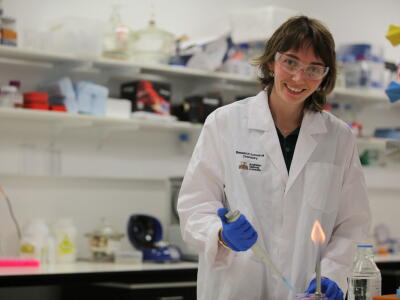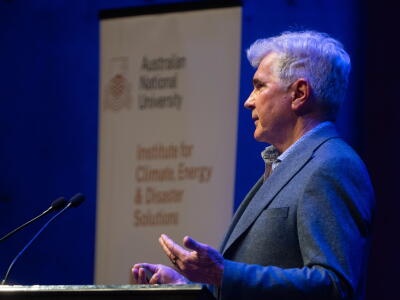Flippers and jaws: ANU researchers are 'tagging' marine life to protect ocean health
By: Phillis Zeng
Posted on
For Dr Justin Clarke, a seasoned vet with 30 years of experience, performing surgery on a shark while seasick and hanging off the side of a boat was a first.
As Senior University Veterinarian at The Australian National University (ANU), Dr Clarke volunteered to help on field trips to “tag” tiger sharks and green turtles in Shark Bay, Western Australia, when marine ecologist Associate Professor Ana Sequeira reached out to him.
And that was the start of a continuing collegial research partnership.
As part of the Gathaagudu Animal Tracking (GAT) Project led by Associate Professor Sequeira, from the ANU Research School of Biology, the trips aimed to document and understand the movement and habitat use patterns of tiger sharks, green turtles, and dugongs in the UNESCO World Heritage Area of Shark Bay by deploying satellite and acoustic tracking devices.
“We needed to perform surgical implantation of acoustic tags on sharks but didn’t have the necessary experience,” says Associate Professor Sequeira.
“We were really glad that Justin was able to join us on board and train us.”
Having worked 20 years in clinical practice and 10 years as a university vet, Dr Clarke’s veterinary experience and expertise came in handy for the researchers.
“I had done similar work on smaller sharks and turtles in the past and I’m familiar with using instruments and the suture material. So, I was more than happy to help,” says Dr Clarke.
“It was arduous work on the ship – long hours, lack of sleep, a lot of preparation, cleaning, sampling and storing work besides tagging, and trying to perform surgeries in the moving waves,” he says.
“But I learnt a lot, too. It was a spectacular experience to work with turtles that weighed up to 145 kilograms, which were beautiful, robust creatures, yet endangered.”
Working as a university veterinarian and sitting in the broader ethics team within Research and Innovation Services (RIS), Dr Clarke spends a large amount of time on paperwork, reviewing applications for animal research and making refinements.
“But we (the university veterinarian team) are also happy to and have the necessary institutional support to make ourselves available to support researchers in the field,” he says.
“It’s crucial for us to gain first-hand experience so that we can understand what researchers do and the challenges they face in the field, where conditions are very different from in the labs – especially when considering ethical research requirements.”
“I want to use my expertise to help researchers maximise the information they collect from an animal, while ensuring the animal’s welfare,” he says.
With collaborative support, Associate Professor Sequeira’s team has successfully conducted a series of tagging trips and is setting sail for the next one in late November.
With the tracking devices deployed, Associate Professor Sequeira expects to be able to monitor the animals’ movement, including where and how they feed, nest and breed. The team is trying to understand how these animals use space in their habitats in Shark Bay and to inform conservation management of these species and their surrounding environment.
“Shark Bay has large seagrass meadows providing food for green turtles and dugongs, who are prey to tiger sharks. We are keen to explore the predator-prey interactions among them,” Associate Professor Sequeira says.
“Also, as Shark Bay has been significantly affected by climate change and topicalisation, we would like to investigate the impact on the behaviours of green turtles and dugongs.”
“There’s still a lot about these animals that we don’t know,” says Dr Clarke.
“Every time technology takes a leap, scientists will work out ways to further their research. And part of my role is to go along and help them do that.”
You may also like
Life as an Industry PhD candidate: Rosie Georgelin
PhD candidate Rosie Georgelin is working with industry partner Samsara Eco to push boundaries in infinite plastic recycling.
How Chloe’s PhD partners with industry for plastic solutions
PhD candidate Chloe Gomez is working with industry partner Samsara Eco to push boundaries in infinite plastic recycling.
The legacy of Professor Mark Howden after a decade of leadership at ICEDS
Professor Mark Howden will step down as Director of the ANU Institute for Climate, Energy & Disaster Solutions (ICEDS), concluding a decade of distinguished leadership.

